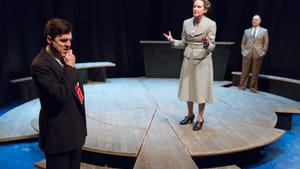Stay in the Loop
BSR publishes on a weekly schedule, with an email newsletter every Wednesday and Thursday morning. There’s no paywall, and subscribing is always free.
Fission quest
Lantern Theater Company presents Michael Frayn's 'Copenhagen'

Some questions remain unanswered even after those doing the asking shuffle off this mortal coil. That’s the central conceit of Michael Frayn’s Copenhagen, at Lantern Theater Company. Three august historical figures occupying a corner of purgatory debate why certain queries — of the logical, moral, and theoretical varieties — produce more mystery than knowledge.
Return visit
Lantern first produced Copenhagen during its 2003-2004 season, hot on the heels of the play’s acclaimed and profitable Broadway debut. The cast of that production — Paul L. Nolan, Sally Mercer, and Charles McMahon, the company’s artistic director — is reassembled here, under the direction of Kittson O’Neill. But like those three actors, now all slightly too old for their roles, Frayn’s play has started to show its age.
Years after their deaths, Danish physicist Niels Bohr (Nolan) and his wife, Margrethe (Mercer), still struggle to understand why Werner Heisenberg (McMahon), Bohr’s beloved pupil, came to visit them in October 1941. By then, Germany had occupied Denmark and both men faced constant government surveillance. Even something as benign as a social call held dangerous implications for all.
But wait: did the meeting actually take place in September? Heisenberg says so. The difference of one month hardly matters, but it speaks to the unreliability permeating the play; if the principals can’t agree on a simple date, good luck getting them on the same page for anything more consequential.
Frayn structures the play as a series of repeating scenes and monologues, with slight changes in movement or wording indicating a shift in a character’s understanding of a specific situation. (Robin Stamey’s unsubtle lighting sometimes telegraphs these moments a bit too nakedly.)
Too close for comfort
For nearly three hours, the conversation between Heisenberg, Bohr, and Margrethe bounces between questions of moral obligation, collegial respect, and problematic patriotism. Although Heisenberg takes pains to distance himself from the Nazi Party, his eloquent justification for continued allegiance to Germany might seem too close for comfort for some 2018 audience members.
Such questions of nationalism also dovetail into the show’s raison d’être: the ethical arguments underpinning the creation of an atomic bomb. Heisenberg felt a duty to deliver nuclear weapons to Germany, even if he disagreed with its cause. Bohr, who aided the United States in successfully creating agents of atomic warfare, may have saved his country, but his soul cannot escape the weight of those civilians he essentially sentenced to death. As the play progresses, Frayn doubles down on relativistic arguments that primarily allow ambiguity for dramatic purposes.
And perhaps that’s why Copenhagen comes across as less intriguing and important than it did more than a decade ago. Although the questions it asks are still at the forefront of modern life — in some cases, maybe more than ever, when nuclear war once again seems uncomfortably plausible — the arguments surrounding them rarely venture below the surface. The play’s intellectual patina disguises little more than melodrama.
Despite nuanced and elegant work from Mercer, Margrethe emerges as a trope: she’s the firm but kind mother figure who acts as counsel and referee to the temperamental men in her life. Nolan projects a level of stolidity anathema to Bohr’s conflicted psyche, and McMahon’s still-boyish charm undermines Heisenberg’s mercurial nature. O’Neill never builds enough tension to keep the proceeds engaging over a long running time.
Ultimately, Nick Embree’s circular set serves as an unintentional metaphor for the play, which fails to achieve momentum. The actors saunter around its edges, literally spinning their wheels. And we never really come to know why Heisenberg came to Copenhagen after all.
But, really — who cares?
What, When, Where
Copenhagen. By Michael Frayn, Kittson O’Neill directed. Lantern Theater Company. Through February 18, 2018, at St. Stephen’s Theater, 10th and Ludlow Streets, Philadelphia. (215) 829-0395 or lanterntheater.org.
Sign up for our newsletter
All of the week's new articles, all in one place. Sign up for the free weekly BSR newsletters, and don't miss a conversation.

 Cameron Kelsall
Cameron Kelsall